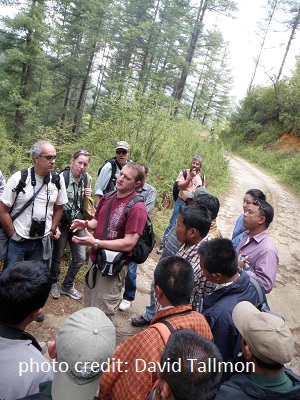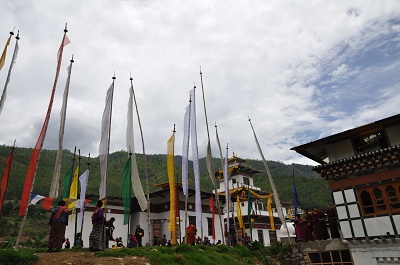Dr. Jan Janecka Helps Develop Bhutan’s First Wildlife Genetics Lab

The kingdom of Bhutan, nestled in the Eastern Himalayas, provides one of the most beautiful and untouched natural environments in the world. As Bhutan is starting to industrialize; Nawang Norbu, director of the Ugyen Wangchuck Institute of Conservation and the Environment (UWICE), wants to learn more about conservation efforts that can be made to ensure that Bhutan develops in an environmentally friendly manner. Norbu enlisted Dr. L. Scott Mills, professor at the University of Montana, who invited a group of 12 scientists from all over the world including Dr. Jan Janecka, post doctoral research associate in the Veterinary Integrative Biosciences department at the Texas A&M University College of Veterinary Medicine & Biomedical Sciences (CVM), to develop Bhutan’s first wildlife genetics lab.
Janecka and his colleagues spent 10 days in May in Bhutan to instruct the conservation leaders and specialists of Bhutan on the latest techniques used in wildlife conservation efforts and to produce a handbook of practical procedures for conducting wildlife research in remote rugged landscapes. The workshop included two days in a classroom setting teaching the fundamentals of research and monitoring of wildlife, and then putting the techniques into use. Janecka and his colleagues spent four days in the field training the specialists from Bhutan so the processes could be continued when they left.

Janecka specializes in genetic analysis of cryptic cats like the snow leopard, which is prevalent in Bhutan. He is among the first to use this technique on snow leopards, which is a key ingredient of conservation biology and wildlife management because it allows for specialists to understand the species and the population.
“Genetics is the foundation for many research and conservation initiatives including: describing species diversity, understanding the relationship among species, examining biology and ecology, and illuminating population demography,” explains Janecka.
The workshop taught the Bhutanese many concepts, including how to set up a DNA lab, conduct non-invasive DNA surveys, and extract DNA from tissue and scat (feces collected in the field).
“The DNA will be stored and later used to study specific regions of the genome that are of interest to researchers and conservationists,” said Janecka. “By collecting and properly maintaining tissues and DNA samples in Bhutan, there will be a wealth of possible studies that can be initiated by Bhutanese scientists. These will greatly expand the information available for wildlife in Bhutan, facilitating sound conservation initiatives.”
Janecka received his Ph.D. in Wildlife Sciences through a joint program with Texas A&M University and Texas A&M University-Kingsville in 2006. He is currently the genetics research program director for the Snow Leopard Conservancy. He is also a member of the International Union for Conservation of Nature (IUCN) Cat Specialist Group and he has traveled and conducted research in Thailand, Laos, India, China, and Mongolia.

“It was an honor to be asked to go and share my knowledge in such a beautiful country filled with charismatic people who took our conservation efforts seriously,” said Janecka. “The Bhutanese were so passionate about wildlife and conserving the environment. The potential to discover something in this remote area is great and I am excited that I had the possibility to do so.”


